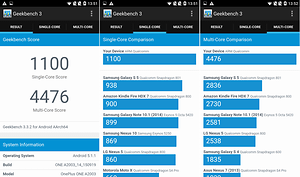

- Oneplus benchmarks geekbench cheating 1080p#
- Oneplus benchmarks geekbench cheating software#
- Oneplus benchmarks geekbench cheating series#
The trigger process for benchmarking apps will not be present in upcoming OxygenOS builds on the OnePlus 3 and OnePlus 3T.” The company released this statement at the time: “In order to give users a better user experience in resource intensive apps and games, especially graphically intensive ones, we implemented certain mechanisms in the community and Nougat builds to trigger the processor to run more aggressively. SEE ALSO: iPhone 7 is fastest smartphone, demolishes competition - Antutu Recall that XDA Developers, a mobile-software development community, and Primate Labs, makers of cross-platform processor benchmark Geekbench, discovered that the processor clock speeds of the OnePlus 3 and 3T get an artificial boost every time the phones detect certain benchmark apps running. This is not the first time that it has been caught cheating to fare better in benchmarks. The Chinese smartphone maker is accused of manipulating benchmarks to get higher scores. The OnePlus 5 model with 6GB of RAM and 64GB of internal storage retails at $479 (P24,039), and the variant with 8GB of RAM and 128GB of built-in memory sells for $539 (P27,050).Īll’s not well in OnePlus-ville, though. The model with 6GB of RAM and 64GB of internal storage retails at $479 (P24,039), and the variant with 8GB of RAM and 128GB of built-in memory sells for $539 (P27,050). The action follows the discovery that a preloaded app on.
Oneplus benchmarks geekbench cheating series#
But take note that starting price is $40 (roughly P2,007) higher than the cost of the OnePlus 3T at launch. Popular benchmark app Geekbench confirmed it banned the Galaxy S22 series and other Samsung phones found to be cheating in benchmark apps.
Oneplus benchmarks geekbench cheating software#
They are confident that OnePlus will remove this benchmark cheating code from their software in devices they sell to consumers.Įither way, this instance is yet another reminder to not take benchmark scores too seriously when you’re deciding to buy your next smartphone.You may buy the phone through OnePlus’ limited, early-drop sale (just go to this page and input the code “Clearer Photos”) before regular selling starts June 27. Typically, most phones have thermal throttling that won’t let the phone reach that high a temperature in the first place.Ī statement from OnePlus suggests that they are “not overclocking the device”, which the folks at XDA find appalling because the ROM does exactly that when those select benchmark apps are run. What’s more interesting - when running GFXBench’s Manhattan Battery test, the OnePlus 5 posted temperatures of 50☌ or 122☏, which means the device was uncomfortably hot to hold. Although the difference isn’t much, it is probably enough for some unsuspecting reviewers to declare the OnePlus 5 as the performance king among other competing phones. The result? The multi-core scores in Geekbench 4, for instance, came in at over 6700 when the hidden build of Geekbench (to check what the phone should realistically score) didn’t post a score above 6500. Upon execution, the phone would boost the CPU to a frequency that it typically wouldn’t run at when using day-to-day applications. Long story short, the ROM running on the test unit was set to detect when benchmark suites like AnTuTu, Androbench, Geekbench 4, GFXBench, Quadrant, Nenamark 2 and Vellamo would execute. XDA Developers, the same publication that had outed OnePlus among other companies early this year for a similar malpractice, found the same issue with its OnePlus 5 review unit. But alas, the company seems to have faltered yet again in artificially inflating benchmark scores in a bid to showcase a numerical superiority.
Oneplus benchmarks geekbench cheating 1080p#
There is no doubt that the recently launched OnePlus 5 is a fast smartphone, thanks to the combination of the Snapdragon 835 chip, 6 or 8GB RAM, fast UFS 2.1 storage, a modest 1080p display, and bloatware-free Android. For example, a device with a 40,000 score in a benchmark suite is not twice as fast as a device with a 20,000 score in the real world. While they numerically suggest the maximum performance a device can deliver, the numbers typically do not correlate to how it performs in the real world. Benchmarks are a bane to the world of smartphones.


 0 kommentar(er)
0 kommentar(er)
